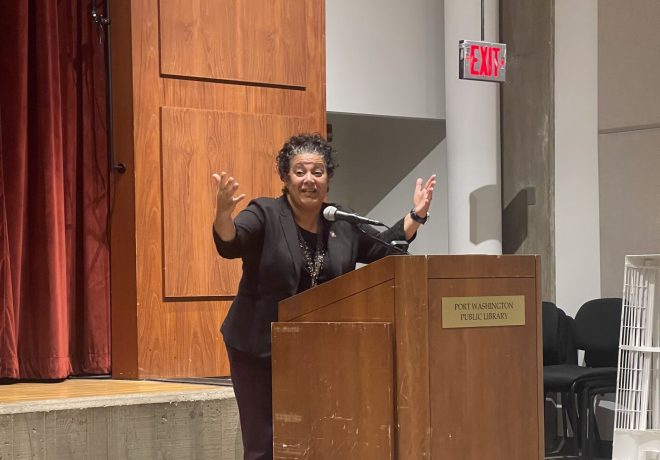Two Democratic women from Nassau were the only ones to show up Monday for a Candidate Forum organized by the North Shore Chapter of the NAACP.
North Shore Branch President Qiana Hobdy moderated the forum at the Port Washington Library and said most of the invited candidates did not respond or declined to attend. Candidates running for Congressional District 3, State Senate District 7, and State Assembly Districts 13 and 16 were invited to participated,
The North Shore chapter of the NAACP organized a Candidate Forum on Monday, Oct. 21, at the Port Washington Library for the candidates of Congressional District 3,
Senate District 7 candidate Kim Keiserman and District 16 Assembly Member Gina Sillitti bucked the trend and showed up
Keiserman discussed her professional background in education and experience in educational advocacy and activism outlining her goals in running for the State Senate.
“As a state senator, I will always be advocating for the funding that our schools need to create the programs that would help serve students who struggle, students who have disabilities or students who are being overlooked,” Keiserman said. “We also have to make sure that we pursue policies that provide standards to make sure that schools are serving all students.”
When asked about how to help minority students succeed in the school system, Keiserman said guidance counseling needs to be considered.
“I think that we need to be putting a lot more resources into guidance counseling and ensuring that all of our students are getting the counseling that they need to help them as they move into careers, college and adult life,” Keiserman said. “I think that currently, we’re not doing enough to provide those services to kids with basic barriers. Whether those barriers are because they’re the first in their family to go to college or whether they’re economic barriers or whether the barrier is simply their interests aren’t the same as all of the other kids.”
Sillitti focused on the issues with the healthcare system in the state.
“I am a proponent of universal health care, government-funded health care, Medicare expansion, Medicaid expansion,” Sillitti said. “We do a lot of it in New York. We’re constantly increasing our Medicaid reimbursements and making sure more people are eligible, but the fact that people can go broke in this state because they get cancer or break their leg is disgusting. I think our federal government has an obligation to do this.”
While one of the biggest parts of the New York budget is health care, it’s not enough, Sillitti said.
“It’s not enough for our healthcare workers. It’s not enough for our drug service providers who are working with people with disabilities. And it’s not enough for people to afford healthcare,” Sillitti said.
Keiserman and Sillitti both discussed the political polarization of housing in the state and believe that discussions to solve housing issues should happen on the local level rather than a one-size-fits-all approach from the state.
“We need to be able to bring together local town supervisors and people in village government and other stakeholders to have these discussions to identify the obstacles in increasing housing options in our communities and overcome those obstacles. And so some of the obstacles are just identifying locations,” Keiserman said.
“Incentives for towns who want to increase their housing. Allow them to do studies,” Sillitti said. “They want to put in sewers; let’s give them sewer study money. They want to do a master plan to figure out additional housing, then give them the tools and incentives so they can build and develop where their community wants it.”

